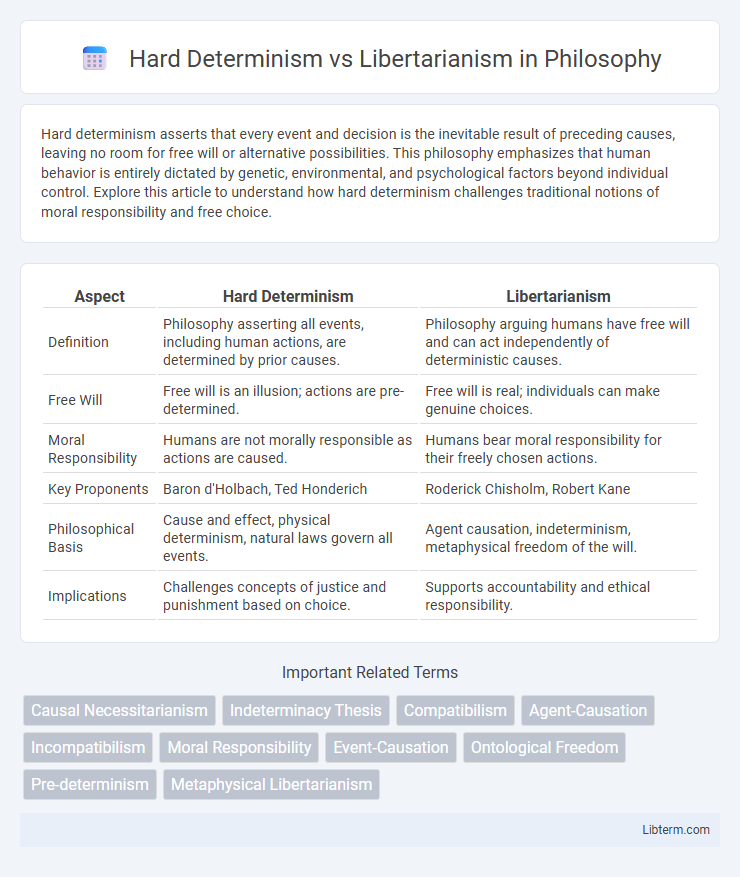Hard determinism asserts that every event and decision is the inevitable result of preceding causes, leaving no room for free will or alternative possibilities. This philosophy emphasizes that human behavior is entirely dictated by genetic, environmental, and psychological factors beyond individual control. Explore this article to understand how hard determinism challenges traditional notions of moral responsibility and free choice.
Table of Comparison
| Aspect | Hard Determinism | Libertarianism |
|---|---|---|
| Definition | Philosophy asserting all events, including human actions, are determined by prior causes. | Philosophy arguing humans have free will and can act independently of deterministic causes. |
| Free Will | Free will is an illusion; actions are pre-determined. | Free will is real; individuals can make genuine choices. |
| Moral Responsibility | Humans are not morally responsible as actions are caused. | Humans bear moral responsibility for their freely chosen actions. |
| Key Proponents | Baron d'Holbach, Ted Honderich | Roderick Chisholm, Robert Kane |
| Philosophical Basis | Cause and effect, physical determinism, natural laws govern all events. | Agent causation, indeterminism, metaphysical freedom of the will. |
| Implications | Challenges concepts of justice and punishment based on choice. | Supports accountability and ethical responsibility. |
Introduction to the Free Will Debate
Hard Determinism asserts that all human actions are determined by prior causes, eliminating genuine free will and moral responsibility. Libertarianism argues that individuals possess free will, enabling autonomous decision-making independent of deterministic factors. The free will debate centers on whether human behavior is governed by causality or if autonomous choice exists beyond deterministic constraints.
Defining Hard Determinism
Hard determinism asserts that all events, including human actions, are causally determined by preceding events and natural laws, denying the existence of free will. This position holds that moral responsibility is an illusion because individuals cannot act otherwise than they do. Philosophers like Baron d'Holbach and Ted Honderich emphasize the inevitability of determinism based on physics, biology, and psychology.
Understanding Libertarianism (Free Will)
Libertarianism asserts that free will is an essential aspect of human agency, rejecting determinism by emphasizing the ability to make genuinely undetermined choices. It argues that individuals possess the power to initiate actions independently of causal chains, highlighting moral responsibility and personal autonomy. Key philosophers like Robert Kane and Roderick Chisholm advocate this view by defending the concept of agent causation as the foundation for true freedom.
Historical Roots and Influential Philosophers
Hard Determinism traces its historical roots to ancient Stoic philosophers like Chrysippus, who emphasized causal necessity, and was further developed by Enlightenment thinkers such as Baron d'Holbach, who argued that free will is an illusion due to deterministic natural laws. Libertarianism, rooted in the works of early modern philosophers like Rene Descartes and later championed by Immanuel Kant, asserts that human agents possess genuine free will, opposing deterministic doctrines and grounding moral responsibility in autonomous choice. Both philosophical positions have deeply influenced contemporary debates on free will, with Hard Determinism emphasizing causal inevitability and Libertarianism defending agent-causation and metaphysical freedom.
Core Arguments for Hard Determinism
Hard Determinism asserts that every event, including human actions, is causally determined by an unbroken chain of prior occurrences governed by natural laws, eliminating genuine free will. Proponents argue that moral responsibility is an illusion since individuals cannot act otherwise than they do, given their genetic makeup and environmental influences. This perspective contrasts sharply with Libertarianism, which maintains that free will is real and individuals possess the capacity to make undetermined choices independent of past events.
Key Arguments Supporting Libertarianism
Libertarianism asserts that free will is essential for moral responsibility, arguing that individuals must have genuine choices unaffected by prior causes. The key argument centers on the incompatibility of determinism with personal agency, emphasizing that humans possess non-determined mental states enabling autonomous decision-making. Neurophilosophical studies and introspective experiences support libertarian claims by highlighting moments of deliberate choice that cannot be fully explained by deterministic processes.
Scientific Perspectives: Neuroscience and Physics
Hard determinism in neuroscience emphasizes that brain activity and neural processes follow predictable, law-governed patterns, suggesting that human behavior is predetermined by physical states. Libertarianism challenges this by proposing that conscious intention and free will emerge from complex brain functions, allowing for genuine choice beyond deterministic causality. Recent advances in quantum physics introduce indeterminacy at a fundamental level, providing potential scientific support for libertarian claims of non-determined action despite the brain's biological constraints.
Moral Responsibility and Ethical Implications
Hard Determinism asserts that all events, including human actions, are predetermined by prior causes, negating genuine moral responsibility as free will is an illusion. Libertarianism argues for an indeterministic free will, holding individuals morally accountable for their choices due to their capacity for genuine alternative possibilities. The ethical implications hinge on whether justice systems should emphasize punishment or rehabilitation based on the belief in autonomous agency versus deterministic causation.
Contemporary Debates and Criticisms
Contemporary debates on Hard Determinism versus Libertarianism center on the compatibility of free will with causal determinism, with Hard Determinists arguing that every event, including human actions, is causally determined by preceding events and thus free will is an illusion. Libertarianism counters by asserting that agents possess genuine free will, emphasizing indeterminism and agent causation as necessary for moral responsibility. Criticisms of Hard Determinism highlight its challenge to notions of moral accountability, while Libertarianism faces scrutiny over the coherence of indeterministic free will and the metaphysical grounding of agent causation.
Conclusion: Bridging or Deepening the Divide
Hard Determinism asserts that every event, including human actions, is causally determined by preceding factors, negating free will, whereas Libertarianism upholds the existence of free will as incompatible with determinism. The ongoing debate intensifies philosophical inquiry into moral responsibility, with neuroscientific findings challenging traditional notions of autonomy. Bridging this divide requires integrating insights from quantum mechanics, cognitive science, and ethics to develop a nuanced framework that accommodates both causal influence and agentive freedom.
Hard Determinism Infographic

 libterm.com
libterm.com